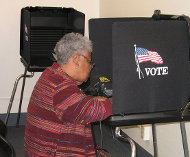10/5/2011
Albuquerque, New Mexico Voters Reject Red Light CamerasAlbuquerque, New Mexico becomes the sixteenth city where voters rejected the use of photo enforcement.

Voters in Albuquerque, New Mexico turned out in large numbers Tuesday to vote down the use of automated ticketing machines. Nearly 40,000 ballots were cast on an advisory question that City Councilor Dan Lewis placed before voters.
"Shall the Albuquerque City Council continue authorizing the 'safe traffic operations program,' commonly called the 'red light camera program'?" the ballot asked.
With all precincts reporting, 53.4 percent said "no" to the cameras. Unlike past referendum efforts, the city council created the ballot measure rather than citizen activists. Redflex Traffic Systems, the Australian company that runs the camera program in Albuquerque, put on an all-out effort to advertise in support of photo ticketing.
Registered voters received flyers in their mailbox that were designed to appear as if they had come from a grassroots group. The material showed pictures of twisted wreckage from a car crash bearing the message: "There's a way to avoid this. Vote yes for safe roads on October 4." The source for the pamphlet was only listed as Safe Roads Albuquerque, but according to disclosures filed with the city, Redflex contributed $142,050 to the group, essentially the entire budget for Safe Roads. In effect, Redflex paid the public relations firm DW Turner $104,075 to run Safe Roads, and the rest of the Redflex money went to buy local media.
After Lewis announced he was going to file an ethics complaint against the Australian company for violating the city's disclosure rules, Redflex quickly changed the name of its front group to state that it was "Paid for by Safe Roads Albuquerque Supported by Redflex Traffic Systems." In April, Lewis threw his hat in the ring to run as a Republican for the congressional seat now held by Democrat Martin Heinrich.
The Redflex loss in Albuquerque does not bode well for the red light camera industry which faces upcoming referendum votes in three Ohio cities -- Ashtabula, South Euclid and East Cleveland -- and three Washington cities -- Bellingham, Longview and Monroe. Later votes are likely in two California cities -- Murrieta and Westminster -- and two Texas cities -- Dayton and Port Lavaca. A vote is also likely in Redmond, Washington.
No photo ticketing program has ever survived such a vote. During the 2010 midterms, voters in Houston and Baytown, Texas as well as Garfield Heights, Ohio rejected red light cameras. The vote in Mukilteo, Washington was 70 percent against the cameras and 73 percent in Anaheim, California. In May 2010, 61 percent of Sykesville, Maryland voters overturned a speed camera ordinance. In 2009, eighty-six percent of Sulphur, Louisiana rejected speed cameras. The November elections included three votes: 72 percent said no in Chillicothe, Ohio; Heath, Ohio and College Station, Texas also rejected cameras. In 2008, residents in Cincinnati, Ohio rejected red light cameras. Seventy-six percent of Steubenville, Ohio voters rejected photo radar in 2006. In the mid-1990s, speed cameras lost by a two-to-one margin in Peoria, Arizona and Batavia, Illinois. In 1997, voters in Anchorage, Alaska banned cameras even after the local authorities had removed them. In 2003, 64 percent of voters in Arlington, Texas voted down "traffic management cameras" that opponents at the time said could be converted into ticketing cameras.


